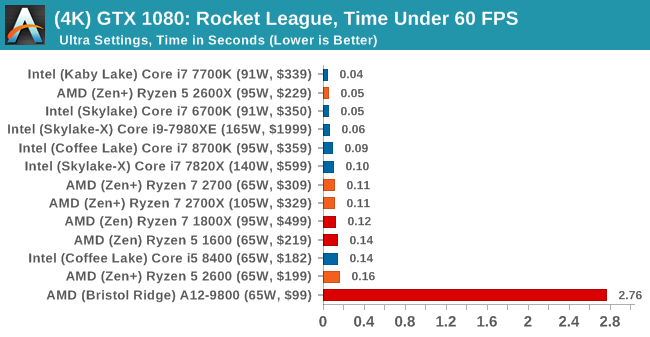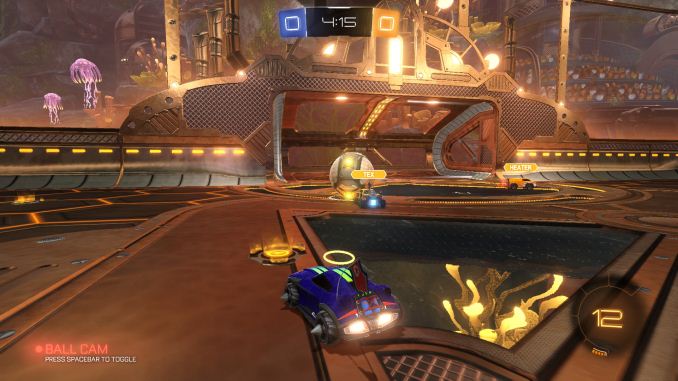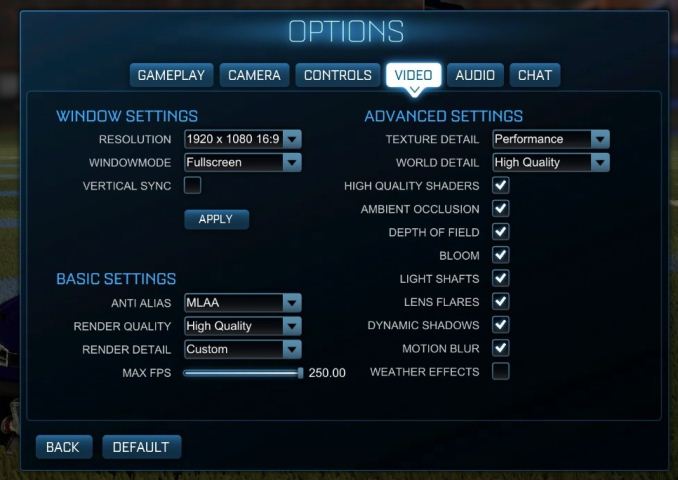The AMD 2nd Gen Ryzen Deep Dive: The 2700X, 2700, 2600X, and 2600 Tested
by Ian Cutress on April 19, 2018 9:00 AM ESTRocket League
Hilariously simple pick-up-and-play games are great fun. I'm a massive fan of the Katamari franchise for that reason — passing start on a controller and rolling around, picking up things to get bigger, is extremely simple. Until we get a PC version of Katamari that I can benchmark, we'll focus on Rocket League.
Rocket League combines the elements of pick-up-and-play, allowing users to jump into a game with other people (or bots) to play football with cars with zero rules. The title is built on Unreal Engine 3, which is somewhat old at this point, but it allows users to run the game on super-low-end systems while still taxing the big ones. Since the release in 2015, it has sold over 5 million copies and seems to be a fixture at LANs and game shows. Users who train get very serious, playing in teams and leagues with very few settings to configure, and everyone is on the same level. Rocket League is quickly becoming one of the favored titles for e-sports tournaments, especially when e-sports contests can be viewed directly from the game interface.
Based on these factors, plus the fact that it is an extremely fun title to load and play, we set out to find the best way to benchmark it. Unfortunately for the most part automatic benchmark modes for games are few and far between. Partly because of this, but also on the basis that it is built on the Unreal 3 engine, Rocket League does not have a benchmark mode. In this case, we have to develop a consistent run and record the frame rate.
Read our initial analysis on our Rocket League benchmark on low-end graphics here.
With Rocket League, there is no benchmark mode, so we have to perform a series of automated actions, similar to a racing game having a fixed number of laps. We take the following approach: Using Fraps to record the time taken to show each frame (and the overall frame rates), we use an automation tool to set up a consistent no-bot match on easy, with the system applying a series of inputs throughout the run, such as switching camera angles and driving around.
It turns out that this method is nicely indicative of a real match, driving up walls, boosting and even putting in the odd assist, save and/or goal, as weird as that sounds for an automated set of commands. To maintain consistency, the commands we apply are not random but time-fixed, and we also keep the map the same (Aquadome, known to be a tough map for GPUs due to water/transparency) and the car customization constant. We start recording just after a match starts, and record for 4 minutes of game time (think 5 laps of a DIRT: Rally benchmark), with average frame rates, 99th percentile and frame times all provided.
The graphics settings for Rocket League come in four broad, generic settings: Low, Medium, High and High FXAA. There are advanced settings in place for shadows and details; however, for these tests, we keep to the generic settings. For both 1920x1080 and 4K resolutions, we test at the High preset with an unlimited frame cap.
All of our benchmark results can also be found in our benchmark engine, Bench.
MSI GTX 1080 Gaming 8G Performance
1080p



4K
















545 Comments
View All Comments
spdragoo - Thursday, April 19, 2018 - link
Per Tom's Hardware (https://www.tomshardware.com/reviews/amd-ryzen-7-2..."Our test rigs now include Meltdown And Spectre Variant 1 mitigations. Spectre Variant 2 requires both motherboard firmware/microcode and operating system patches. We have installed the operating system patches for Variant 2.
Today's performance measurements do not include Intel's motherboard firmware mitigations for Spectre Variant 2 though, as we've been waiting for AMD patches to level the playing field. Last week, AMD announced that it’s making the mitigations available to motherboard vendors and OEMs, which the company says should take time to appear in the wild. We checked MSI's website for firmware updates applicable to our X370 platforms when AMD made its announcement, but no new BIOSes were available (and still aren't).
Unfortunately, we were only made aware that Variant 2 mitigations are present in our X470 board's firmware just before launch, precluding us from re-testing the Intel platforms with patches applied. We're working on this now, and plan to post updated results in future reviews.
The lack of Spectre Variant 2 patches in our Intel results likely give the Core CPUs a slight advantage over AMD's patched platforms. But the performance difference should be minimal with modern processors."
For those that are TL:DR in their viewpoint: unlike Anandtech, TH did NOT include all of the Spectre/Meltdown patches, & even said that there might be differences in their test results.
Chris113q - Thursday, April 19, 2018 - link
Other reviewers also had their setups meltdown/spectre patched and it's been already confirmed that these patches don't greatly impact gaming performance at all.It's clear that Anandtech's results are wrong here. I have read 12 other reviews and most of their results differ from the ones you got. You'd have to be delusional to take just 1 review as the absolute truth.
Ninjawithagun - Thursday, April 19, 2018 - link
Incorrect. Those reviews were conducted back in January 2018 (look at the review dates). Microsoft issued new patches for Meltdown and Spectre earier this month (April 2018). I could find no other performance review showing performance gain/loss for Intel CPUs based upon the new patches other than the one posted now by AnandTech.Ninjawithagun - Thursday, April 19, 2018 - link
The only way to know for sure is for each hardware reviewer to provide the exact version of Windows 10 they used for testing. This will prove whether or not they ran benchmarks with the most current Windows updates/patches.Intel999 - Thursday, April 19, 2018 - link
It is plausible that many reviewers were lazy and carried over data from earlier reviews on Intel and 1000 series Ryzen CPUs.Thank you Anandtech for doing aa genuinely unbiased review that required a great deal of extra work compared to others.
5080 - Thursday, April 19, 2018 - link
And don't forget BIOS patches as well. If you have a fully patched system the impact is even bigger than just updating with the Windows KB patches.sor - Thursday, April 19, 2018 - link
Looking at Tom’s results, they have OC intels in first place. Other than that it’s damn close. Is there a chance you’re just browsing graphs to see who is in the top spot and not really comprehending the results?Aside from that, the test setups and even benchmarks used are different. You owe Ian an apology for not realizing you’re comparing OC results to his.
Silma - Thursday, April 19, 2018 - link
Yes. Ian is a top reviewer. At worst he made a mistake in this evaluations. It happens to the best of us.However, I have an issue with non OC test. It seems to me people will purchase overclockable processors and graphic cards to overclock them. At least game results should probably be based on OC benchmarks.
pogostick - Thursday, April 19, 2018 - link
@Silma No, it makes more sense to do it this way. Everyone who buys these processors are guaranteed to have a part that will run the manufacturer spec. OC is a random lottery.ACE76 - Thursday, April 19, 2018 - link
Wrong... majority of even gamers DON'T overclock...that us relagated to a niche market of enthusiasts.